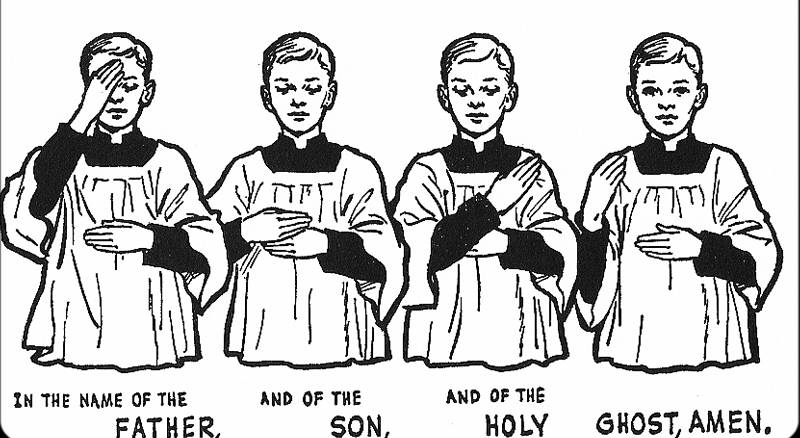Trivial Pursuit?
It is interesting to see how readership fluctuates when current events are not regularly commented on.
 With many good and reliable sites to choose from for this purpose, we think that regularly adding our general alarm over what is happening in politics, the world, and the Church seems to be wasted breath.
With many good and reliable sites to choose from for this purpose, we think that regularly adding our general alarm over what is happening in politics, the world, and the Church seems to be wasted breath.
It is not that current events go ignored (hardly!), but although we don’t have much control over most things going on, we always have some control over ourselves, and there is never a time where a situation or circumstance cannot be used to sanctify ourselves.
Getting too wrapped up in current events tends to distract us from things more local that perhaps need real attention regardless of who’s right, who’s wrong, or what’s bad out there. If a person is not in a state of grace, in the big picture how much does it really matter who is president, what the latest scandal is, or what’s the next item on the woke agenda?
And if someone is in a state of grace, who is President, what the latest scandal is, or what the next item on the woke agenda is shouldn’t affect that either.
True, while there are responses that may be required to such things that will test us like gold in the fire, ignoring the fundamentals helps no one, so we should not be tempted to think having concern for them in these tumultuous times is tantamount to rearranging the deck chairs on the Titanic.
It is noteworthy that our Lord restores only three people to life in the course of His public ministry. Each of these restorations carry with them specific circumstances that reveal a spiritual meaning. While these three restorations evidently show Christ’s power over life and death (which is most perfectly demonstrated in His own Resurrection), and also manifest the resurrection of the body which we will all enjoy some day, they also reveal the restoration of the soul from sin, a restoration of the life of grace, which is much more important than our physical life.
Lazarus, having been dead four days, seeing Christ weep before calling him forth, and emerging from the tomb bound hand and foot is representative of a soul steeped in habitual mortal sin, indicating the effort involved to be loosed entirely from it (cf. Jn. 11:1-45).

The widow’s son at Naim, having only recently died and being carried on a stretcher, is met by Christ while still within the city; he is restored and quickly given back to his mother (the Church), representing a soul in mortal sin that is not habitual (cf. Lk. 7:11-17).
Finally, the young daughter of Jairus is representative of a soul quick to commit deliberate venial sin, for in this case she still remains in the house (symbolizing the state of grace) and is said to only be sleeping rather than dead (cf. Lk. 8:41-56).
In regard to this latter case, because venial sin is a lesser offense, we tend at times to trivialize it. We forget that any sin is not trivial because it points to some sickness in the soul and had a painful effect upon our Lord on the Cross. After all, venial sin is the cause of a soul’s detention in Purgatory; while being a lesser offense and not destroying the life of grace in a soul (as does mortal sin), it still serves to weaken that life and dishonor God.
St. Francis de Sales comments that we all have dispositions and inclinations to venial sin, and we cannot be wholly free from them for any prolonged period of time because of our damaged nature; this applies even to the saints. For a just man shall fall seven times and rise again, but the wicked shall fall down into evil (Prov. 24:16).
But it is one thing to commit venial sins out of carelessness or weakness, and quite another to willingly choose and take delight in them. For instance, a lie may be spoken through thoughtlessness or fear, but a lie may also be told out of some sense of empowerment it gives a person: the difference is clear.
 An example of a large blazing bonfire provides further insight. The fire is the life of God in the soul (state of grace) and the degree of love we have is the degree of heat it gives off. A venial sin committed through carelessness is like using a small glass of water; the water is quickly consumed by the fire and has a nominal effect. Deliberate venial sins would be like using a small pail that dampens the fire somewhat while being incapable of putting it out. Mortal sin would be like using a fire extinguisher.
An example of a large blazing bonfire provides further insight. The fire is the life of God in the soul (state of grace) and the degree of love we have is the degree of heat it gives off. A venial sin committed through carelessness is like using a small glass of water; the water is quickly consumed by the fire and has a nominal effect. Deliberate venial sins would be like using a small pail that dampens the fire somewhat while being incapable of putting it out. Mortal sin would be like using a fire extinguisher.
So although any number of venial sins will never equal a mortal sin, persisted deliberate venial sin serves to weaken the life of grace in the soul and inhibits the ability to rekindle the fire to the intensity it was at; the more this happens, the more a disposition can form towards serious sins. A person, for example, who deliberately, needlessly, and regularly talks about others’ faults will become less and less concerned about what she says, and eventually could find herself guilty of gravely damaging another’s reputation.
Remember that temptations tend to follow an incremental path.
Deliberate venial sins cause God to withdraw His help. As a result, these lessen our own disposition to pursue what is good, make the pursuit of holiness more difficult or distasteful, and serve to open the door to new temptations. We risk becoming lukewarm in the service of God. As fire of less intensity requires less water to extinguish it, repeated and purposeful neglects that pile up can have enormous consequences.
So what are the remedies, as this is a struggle for us all?
If venial sin is a bad act that diminishes the life of God in the soul, then good works serve to increase this life. Therefore, venial sin can be readily remitted through works of charity performed in a right spirit of humility. And we have, by the grace and mercy of God, countless opportunities to make up for these offenses in the course of our daily lives. We always stand in need of God, and He always wills our holiness, so there is no reason why we cannot use what He places at our disposal for the remission of sin and temporal guilt.
These things need not be large or even exceptionally difficult, but rather endured with a spirit of love for God, His Cross, and resignation to His will. In fact, St. Augustine points out that a single Our Father said from the heart will obliterate the venial sins of a whole day.

It can be just that simple: even things like making the Sign of the Cross or genuflections with attention (and trying to make this a habit), the proper use of holy water or sacramentals, the blessing of a priest, thoughtful recitation of prayers or assistance at Mass (even if we have to spend half the time fighting off distractions or, if young children are involved, fighting with distractions), devout receptions of Holy Communion, holding the tongue instead of needlessly complaining about something we have no control over, truly praying for enemies, patiently bearing with the defects of others (like a spouse) and not letting it cause embitterment, humbly admitting when one is wrong, forgiving another from the heart, all these and more serve to remit our venial sins assuming we are making the necessary efforts to stop committing them deliberately.
Of course, monthly confession of venial sins we know to be more deliberate can greatly assist us in getting a handle on things; this cannot be more encouraged.
So if we sense that our spiritual life may be a bit lukewarm, perhaps consider where we are being careless and renew our efforts through prayer, the Sacraments, and good works towards the patching up of those cracks that we knowingly let develop. We are always a work in progress, so do not get discouraged. However, deliberate venial sin is hardly a trivial matter (remember, we are not talking about sins committed out of weakness), because if the goal in life is to love God with our whole heart, mind, soul, and strength.
What kind of love would it be if we deliberately choose to displease Him?
Taken from this perspective, our Lord’s description of the little girl as sleeping is really quite accurate, because deliberate and persisted venial sin serves to lull the soul to sleep, no longer sensitive to the influence of grace, before it eventually dies.

We are all given the grace from God to take the steps to know and overcome our deliberate venial sins and to make up for them while here on earth. Who is President, the latest scandal, or the next item on the woke agenda may give us opportunities to grow in virtue that we prefer not to have, but they are opportunities nonetheless.
None of us should want to go to Purgatory, and the trials and crosses we meet with here are simply God’s way of telling us that He does not want us to go there either.
March 22, 2021








